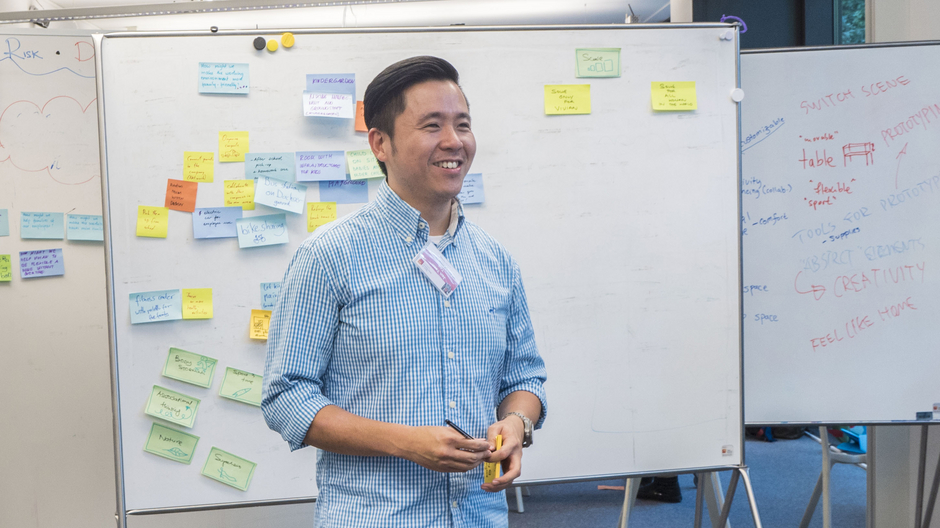Meet our new Design Thinking program manager Jen Tzen Tan
We are happy to welcome a new colleague to the HPI D-School team! In August, Jen Tzen Tan, who prefers to be called Jentz (like “ladies and gents”), started working at the HPI D-School Potsdam. Together with Dr. Claudia Nicolai, Stefanie Gerken, Christian Smirnow, and Samuel Tschepe he will co-lead and co-design our Design Thinking academic programs. Previously, Jentz worked as a program manager at our partner D-School Genovasi Malaysia and as an innovation consultant in Belgium. To learn more about his background and experiences with Design Thinking, we asked Jentz a couple of questions.
Hi Jentz, welcome to the HPI D-School! You have a background in accounting & finance. How did you get involved in Design Thinking? What do you find so intriguing about it that made you pursue a career in Design Thinking?
I had a bad experience growing up in school. I remember my first year at junior school when I was only six years old, my teacher took a permanent marker and drew whiskers on my face. She said that I was only smart enough to be a cat, simply because I failed to memorize word for word of an entire paragraph from the textbook. This was one of the many discouraging experiences in my early school years that I still remember vividly. As a result, I grew up being passive and lacking the courage to voice up my opinions.
I became slightly better when I entered university but the tipping point happened when I was a participant at Genovasi D-School in Malaysia. My Design Thinking coach and program lead did an incredible job creating an environment that helped me overcome my feeling of insecurity. Experiencing how Design Thinking positively impacted my life, I decided that I too want to make an impact on the lives of others. Hence, I decided to become of the D-School family.
I first came to know about Design Thinking when I conducted market research in Malaysia working as a strategic planner.
When you worked for the Board of Innovation and Genovasi D-school Malaysia you facilitated a wide variety of projects with brands such as Nestle, ASTRO and the Ministry of Education in Malaysia using Design Thinking. Can you tell us about your favorite Design Thinking project?
Of course, the challenge of my favorite project was to redesign the coffee drinking experience. One of our radical ideas was to introduce coffee to school children. When we were told to prototype the idea and test it with parents and children, we knew as a team that this idea would be a total failure. Nonetheless, our facilitator insisted that we proceed to prototype and test our idea and use the reaction of the users as an opportunity to gain a better understanding of the context and the real potentials.
It was interesting to go around offering children free black coffee with their parents standing next to them. Out of several parents we approached, one of them in particular, responded unexpectedly by saying "If my child were to go to a fast food restaurant, ordered a burger menu and requested a black coffee, I would be the happiest parent on earth." We were surprised but she further elaborated that the number one cause of death in Malaysia is diabetes, so why are fast food restaurants allowed to serve heavily sweetened carbonated drinks to children while black coffee, which is comparably healthier, is perceived to be more harmful to children. That was a great learning moment for us as a team.
Why do you think Design Thinking has become so popular and how do you imagine the future of Design Thinking in our world?
Simply because it works. The essence of Design Thinking is to first understand the people you are creating the solution for and just by doing so, an organization already reduces the risk of creating something that is not meaningful.
The world is changing faster than ever before, especially with old technology becoming obsolete. New products or businesses are invented and the old ones are discarded as we enter into the 4th industrial revolution. There is an increasing need for organizations to be innovative in order to be competitive. Organizations have to be creative and take fast decisive action to combat the inevitable challenges in today’s world.
Design Thinking embeds an innovative culture helping organizations to remain relevant to changes and market needs. Therefore, Design Thinking as a mindset towards change and collaboration is essential for a future that embraces the 4th industrial revolution.
Thank you and welcome again to our team. We look forward to working with you!
About Jen Tzen Tan:
Jen Tzen Tan has worked as an innovation consultant and design strategist at the consultancy boardofinnovation in Belgium. Prior to this he has been a Design Thinking lead and program manager at our partner d-school Genovasi in Malaysia for several years and has gained professional experience as an account manager and consultant in branding and auditing. Jen Tzen holds a degree in Business and Commerce from Monash University.


